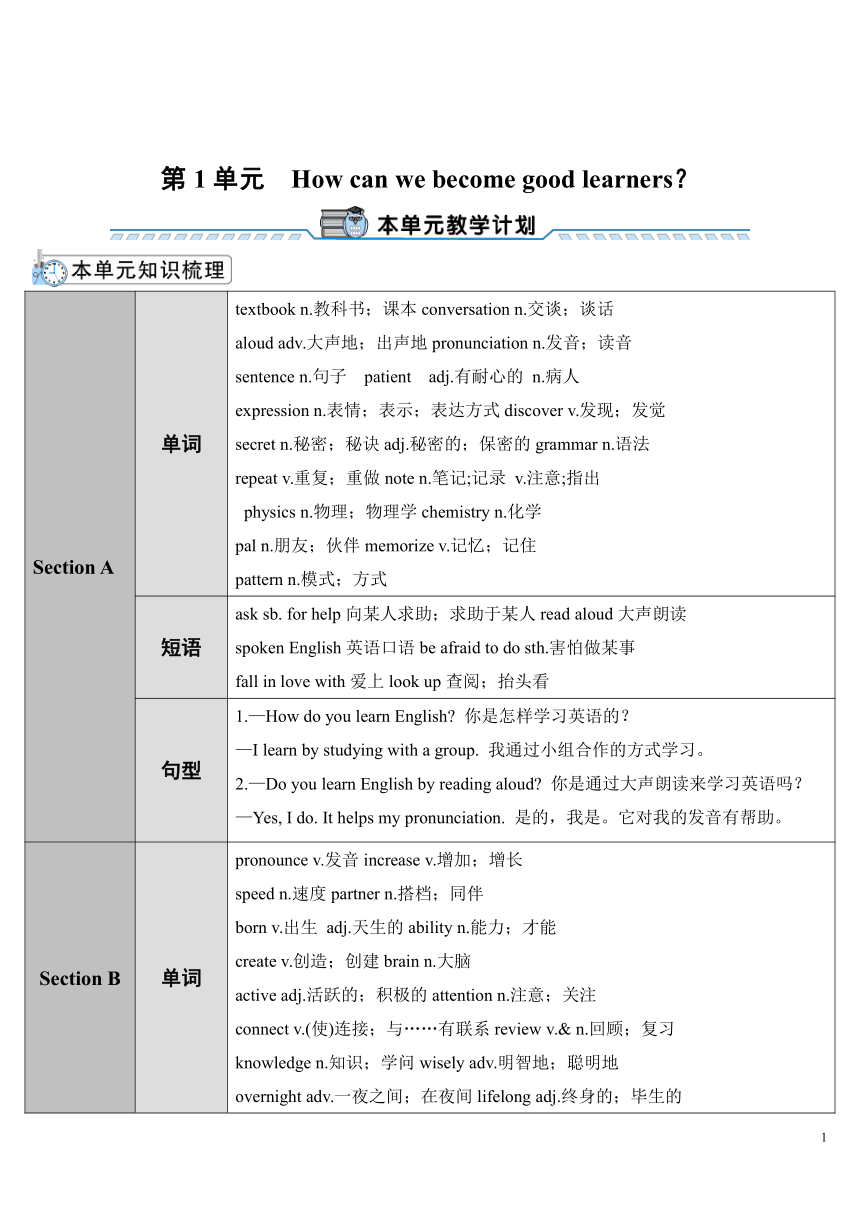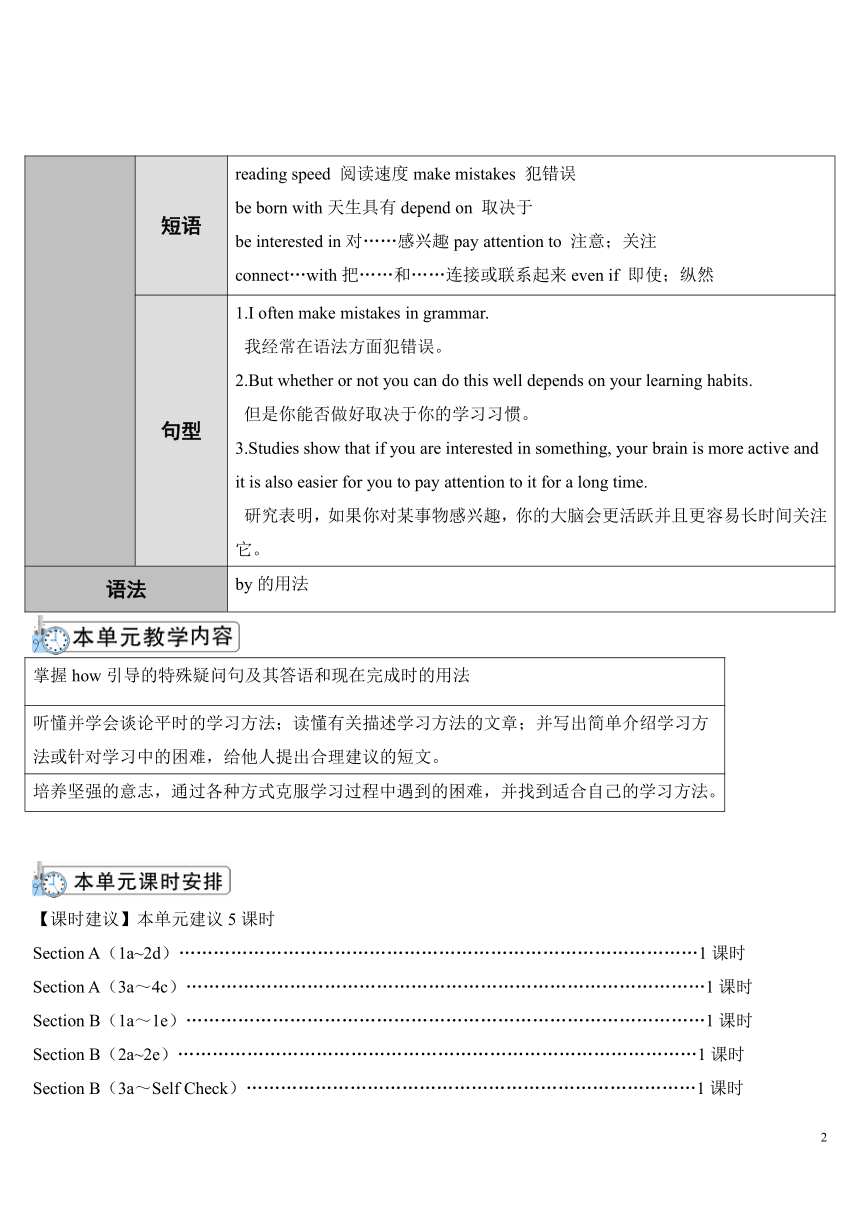How can we become good learners? Section A 第1课时导学案(表格式)
文档属性
| 名称 | How can we become good learners? Section A 第1课时导学案(表格式) |  | |
| 格式 | doc | ||
| 文件大小 | 303.1KB | ||
| 资源类型 | 教案 | ||
| 版本资源 | 人教新目标(Go for it)版 | ||
| 科目 | 英语 | ||
| 更新时间 | 2023-10-21 21:33:37 | ||
图片预览



文档简介
第1单元 How can we become good learners?
Section A 单词 textbook n.教科书;课本conversation n.交谈;谈话aloud adv.大声地;出声地pronunciation n.发音;读音sentence n.句子 patient adj.有耐心的 n.病人expression n.表情;表示;表达方式discover v.发现;发觉secret n.秘密;秘诀adj.秘密的;保密的grammar n.语法repeat v.重复;重做note n.笔记;记录 v.注意;指出 physics n.物理;物理学chemistry n.化学pal n.朋友;伙伴memorize v.记忆;记住pattern n.模式;方式
短语 ask sb. for help向某人求助;求助于某人read aloud大声朗读spoken English英语口语be afraid to do sth.害怕做某事fall in love with爱上look up查阅;抬头看
句型 1.—How do you learn English 你是怎样学习英语的?—I learn by studying with a group. 我通过小组合作的方式学习。2.—Do you learn English by reading aloud 你是通过大声朗读来学习英语吗?—Yes, I do. It helps my pronunciation. 是的,我是。它对我的发音有帮助。
Section B 单词 pronounce v.发音increase v.增加;增长speed n.速度partner n.搭档;同伴born v.出生 adj.天生的ability n.能力;才能create v.创造;创建brain n.大脑active adj.活跃的;积极的attention n.注意;关注connect v.(使)连接;与……有联系review v.& n.回顾;复习knowledge n.知识;学问wisely adv.明智地;聪明地overnight adv.一夜之间;在夜间lifelong adj.终身的;毕生的
短语 reading speed 阅读速度make mistakes 犯错误be born with天生具有depend on 取决于 be interested in对……感兴趣pay attention to 注意;关注connect…with把……和……连接或联系起来even if 即使;纵然
句型 1.I often make mistakes in grammar. 我经常在语法方面犯错误。2.But whether or not you can do this well depends on your learning habits. 但是你能否做好取决于你的学习习惯。3.Studies show that if you are interested in something, your brain is more active and it is also easier for you to pay attention to it for a long time. 研究表明,如果你对某事物感兴趣,你的大脑会更活跃并且更容易长时间关注它。
语法 by的用法
掌握how引导的特殊疑问句及其答语和现在完成时的用法
听懂并学会谈论平时的学习方法;读懂有关描述学习方法的文章;并写出简单介绍学习方法或针对学习中的困难,给他人提出合理建议的短文。
培养坚强的意志,通过各种方式克服学习过程中遇到的困难,并找到适合自己的学习方法。
【课时建议】本单元建议5课时
Section A(1a~2d)………………………………………………………………………………1课时
Section A(3a~4c)………………………………………………………………………………1课时
Section B(1a~1e)………………………………………………………………………………1课时
Section B(2a~2e)………………………………………………………………………………1课时
Section B(3a~Self Check)……………………………………………………………………1课时
词汇短语:主要采用在实际操作中运用的方法。
基本句子:采用多媒体展示和交际法。
语法:现在完成时——采用归纳法和举例法。
Section A 第1课时(1a~2d)
类别 学习重点
重点单词 textbook, aloud, conversation, sentence, pronunciation, patient
重点短语 ask for, give a report, have conversations with sb, too…to…, word by word, get the main ideas
重点句式 1.How do you study for a test 2.What about listening to tapes
课前预习 写一写 1.教科书;课本 textbook 2.交谈;谈话conversation3.大声地;出声地aloud 4.发音;读音pronunciation5.句子sentence 6.有耐心的;病人patient
译一译 1.向某人求助ask sb. for help2.口语技能speaking skills3.和某人交谈have conversations with sb.4.抓住主要意思get the main ideas5.逐词地 word by word
背一背 1.我们怎样能成为好的学习者?How can we become good learners 2.我通过制作单词卡片来学习。I study by making word cards.
新课导入 T:English is widely used all over the world. But it’s not easy to learn English well for us. Because we have no chances to speak English with foreign people. But where there is a will, there is a way. If we keep on speaking and using it, we can learn it well.
新课展示 【完成教材1a~2d的教学任务】1.1a通过实物,如:生词卡,课本,磁带等,练习句式:—How do you study for a test —I study by _________________.典例参考T:How do you study for a test Ss: I study for a test _________________.(1)by working with friends(2)by making word cards(3)by reading the textbook…2.1b听1b录音,并完成1b的练习。3.1c小组练习,让学生借助1a中的信息使用新知识练习对话,并让几组学生展示他们的对话。4.2a第一遍听2a的录音,选出听到的问题。5.2b再听录音,让学生跟读并使2b中的答句与2a中的问题相匹配。6.2c小组练习,让学生结合2a、2b中的信息编对话,练习新句型。7.2d两人一组读2d的对话,然后让2-3对学生表演对话。【语法提要】1.byby是介词,意为“通过;靠”,此处表示方法、手段,后接名词或代词;接动词时,要用动名词形式。如:He had to do all the work by hand.所有的工作他都要靠手工完成。Mr.Green makes a living by teaching.格林先生以教书为生。2.What about doing… What about doing… 是交际用语中常见的结构,不仅可以用来提建议和请求,还可以用来征询对方的看法和意见、打算、身体状况、天气状况等。What about… (How about… )表示“做……怎么样 ”其中about是介词,后接名词、代词或动名词。如:What/How about going shopping with me 和我一起去购物好吗?3.everever用于疑问句时,意为“曾经”。该问句的回答中不能再含有ever,如果是否定回答则常用never。如:—Have you ever been to Mount Emei 你曾去过峨眉山吗?—Yes,I have./No,never.是的,我去过。/不,我从没去过。【问题探究】1.You can improve your English A practicing more.A.by B.with C.of D.in2.我们几乎未曾去那里买过东西。We hardly ever shopped there.
活学活练 (D)1.—How do you study Chinese so well —_________ reading plenty of books.A.ToB.OfC.AtD.By(C)2.—It’s a fine day today.What about _________ —Sounds great!A.go hiking B.go to hikeC.going hiking D.to go to hike(B)3.Tony is very nice.He is the most enjoyable person I _________.A.meet everB.have ever metC.had ever met
布置作业:教师引导学生课后完成本课时对应练习,并预习下一课时内容。
教学反思 本课时通过听说等活动以及学生的自主学习和小组合作,初步学习了用“by+doing”的结构表达做事方式,起到了很好的效果。建议语法部分让学生在预习中先自学理解,课堂上若有疑问可向老师提问,这样老师的讲解会更有针对性。
教学过程中老师的疑问:
教师点评和总结:
教学说明:
通过和学生互动导入新课,引出新课的中心句。
教学说明:
听说结合,第一时间向学生传达语言目标。通过问题探究,使语言目标得以强化。
PAGE
1
Section A 单词 textbook n.教科书;课本conversation n.交谈;谈话aloud adv.大声地;出声地pronunciation n.发音;读音sentence n.句子 patient adj.有耐心的 n.病人expression n.表情;表示;表达方式discover v.发现;发觉secret n.秘密;秘诀adj.秘密的;保密的grammar n.语法repeat v.重复;重做note n.笔记;记录 v.注意;指出 physics n.物理;物理学chemistry n.化学pal n.朋友;伙伴memorize v.记忆;记住pattern n.模式;方式
短语 ask sb. for help向某人求助;求助于某人read aloud大声朗读spoken English英语口语be afraid to do sth.害怕做某事fall in love with爱上look up查阅;抬头看
句型 1.—How do you learn English 你是怎样学习英语的?—I learn by studying with a group. 我通过小组合作的方式学习。2.—Do you learn English by reading aloud 你是通过大声朗读来学习英语吗?—Yes, I do. It helps my pronunciation. 是的,我是。它对我的发音有帮助。
Section B 单词 pronounce v.发音increase v.增加;增长speed n.速度partner n.搭档;同伴born v.出生 adj.天生的ability n.能力;才能create v.创造;创建brain n.大脑active adj.活跃的;积极的attention n.注意;关注connect v.(使)连接;与……有联系review v.& n.回顾;复习knowledge n.知识;学问wisely adv.明智地;聪明地overnight adv.一夜之间;在夜间lifelong adj.终身的;毕生的
短语 reading speed 阅读速度make mistakes 犯错误be born with天生具有depend on 取决于 be interested in对……感兴趣pay attention to 注意;关注connect…with把……和……连接或联系起来even if 即使;纵然
句型 1.I often make mistakes in grammar. 我经常在语法方面犯错误。2.But whether or not you can do this well depends on your learning habits. 但是你能否做好取决于你的学习习惯。3.Studies show that if you are interested in something, your brain is more active and it is also easier for you to pay attention to it for a long time. 研究表明,如果你对某事物感兴趣,你的大脑会更活跃并且更容易长时间关注它。
语法 by的用法
掌握how引导的特殊疑问句及其答语和现在完成时的用法
听懂并学会谈论平时的学习方法;读懂有关描述学习方法的文章;并写出简单介绍学习方法或针对学习中的困难,给他人提出合理建议的短文。
培养坚强的意志,通过各种方式克服学习过程中遇到的困难,并找到适合自己的学习方法。
【课时建议】本单元建议5课时
Section A(1a~2d)………………………………………………………………………………1课时
Section A(3a~4c)………………………………………………………………………………1课时
Section B(1a~1e)………………………………………………………………………………1课时
Section B(2a~2e)………………………………………………………………………………1课时
Section B(3a~Self Check)……………………………………………………………………1课时
词汇短语:主要采用在实际操作中运用的方法。
基本句子:采用多媒体展示和交际法。
语法:现在完成时——采用归纳法和举例法。
Section A 第1课时(1a~2d)
类别 学习重点
重点单词 textbook, aloud, conversation, sentence, pronunciation, patient
重点短语 ask for, give a report, have conversations with sb, too…to…, word by word, get the main ideas
重点句式 1.How do you study for a test 2.What about listening to tapes
课前预习 写一写 1.教科书;课本 textbook 2.交谈;谈话conversation3.大声地;出声地aloud 4.发音;读音pronunciation5.句子sentence 6.有耐心的;病人patient
译一译 1.向某人求助ask sb. for help2.口语技能speaking skills3.和某人交谈have conversations with sb.4.抓住主要意思get the main ideas5.逐词地 word by word
背一背 1.我们怎样能成为好的学习者?How can we become good learners 2.我通过制作单词卡片来学习。I study by making word cards.
新课导入 T:English is widely used all over the world. But it’s not easy to learn English well for us. Because we have no chances to speak English with foreign people. But where there is a will, there is a way. If we keep on speaking and using it, we can learn it well.
新课展示 【完成教材1a~2d的教学任务】1.1a通过实物,如:生词卡,课本,磁带等,练习句式:—How do you study for a test —I study by _________________.典例参考T:How do you study for a test Ss: I study for a test _________________.(1)by working with friends(2)by making word cards(3)by reading the textbook…2.1b听1b录音,并完成1b的练习。3.1c小组练习,让学生借助1a中的信息使用新知识练习对话,并让几组学生展示他们的对话。4.2a第一遍听2a的录音,选出听到的问题。5.2b再听录音,让学生跟读并使2b中的答句与2a中的问题相匹配。6.2c小组练习,让学生结合2a、2b中的信息编对话,练习新句型。7.2d两人一组读2d的对话,然后让2-3对学生表演对话。【语法提要】1.byby是介词,意为“通过;靠”,此处表示方法、手段,后接名词或代词;接动词时,要用动名词形式。如:He had to do all the work by hand.所有的工作他都要靠手工完成。Mr.Green makes a living by teaching.格林先生以教书为生。2.What about doing… What about doing… 是交际用语中常见的结构,不仅可以用来提建议和请求,还可以用来征询对方的看法和意见、打算、身体状况、天气状况等。What about… (How about… )表示“做……怎么样 ”其中about是介词,后接名词、代词或动名词。如:What/How about going shopping with me 和我一起去购物好吗?3.everever用于疑问句时,意为“曾经”。该问句的回答中不能再含有ever,如果是否定回答则常用never。如:—Have you ever been to Mount Emei 你曾去过峨眉山吗?—Yes,I have./No,never.是的,我去过。/不,我从没去过。【问题探究】1.You can improve your English A practicing more.A.by B.with C.of D.in2.我们几乎未曾去那里买过东西。We hardly ever shopped there.
活学活练 (D)1.—How do you study Chinese so well —_________ reading plenty of books.A.ToB.OfC.AtD.By(C)2.—It’s a fine day today.What about _________ —Sounds great!A.go hiking B.go to hikeC.going hiking D.to go to hike(B)3.Tony is very nice.He is the most enjoyable person I _________.A.meet everB.have ever metC.had ever met
布置作业:教师引导学生课后完成本课时对应练习,并预习下一课时内容。
教学反思 本课时通过听说等活动以及学生的自主学习和小组合作,初步学习了用“by+doing”的结构表达做事方式,起到了很好的效果。建议语法部分让学生在预习中先自学理解,课堂上若有疑问可向老师提问,这样老师的讲解会更有针对性。
教学过程中老师的疑问:
教师点评和总结:
教学说明:
通过和学生互动导入新课,引出新课的中心句。
教学说明:
听说结合,第一时间向学生传达语言目标。通过问题探究,使语言目标得以强化。
PAGE
1
同课章节目录
- Unit 1 How can we become good learners.
- Section A
- Section B
- Unit 2 I think that mooncakes are delicious!
- Section A
- Section B
- Unit 3 Could you please tell me where the restroom
- Section A
- Section B
- Unit 4 I used to be afraid of the dark.
- Section A
- Section B
- Unit 5 What are the shirts made of?
- Section A
- Section B
- Review of Units 1-5
- Unit 6 When was it invented?
- Section A
- Section B
- Unit 7 Teenagers should be allowed to choose their
- Section A
- Section B
- Unit 8 It must belong to Carla.
- Section A
- Section B
- Unit 9 I like music that I can dance to.
- Section A
- Section B
- Unit 10 You're supposed to shake hands.
- Section A
- Section B
- Review of Units 6-10
- Unit 11 Sad movies make me cry.
- Section A
- Section B
- Unit 12 Life is full of the unexpected
- Section A
- Section B
- Unit 13 We're trying to save the earth!
- Section A
- Section B
- Unit 14 I remember meeting all of you in Grade 7.
- Section A
- Section B
- Review of Units 11-14
